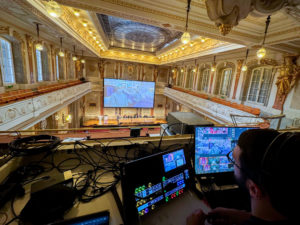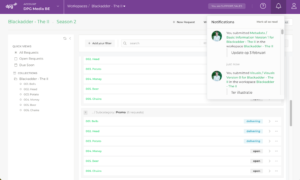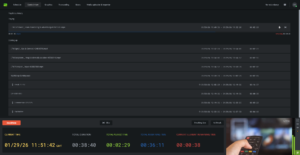For decades television stations, news channels and streaming services have had no choice but to rely on limited technologies to deliver the graphics that support the weather story. Finally, there’s a solution that removes the complex technical and logistical difficulties and eases workflow; future-proofing the weather forecasting industry against rapidly changing technology and unexpected global events.
Hardware Has Been Holding Weather Back
One of the most problematic issues facing weather programs is the hardware that has long been a necessary part of broadcast. With monolithic weather solutions, specific dedicated equipment and expensive on-premises infrastructure, forecasters have relied on an awkward, overgrown setup to provide their service.
The hardware solutions that have been the mainstay of weather forecasting since the 90s are fast becoming historic relics. They are costly, complex to run, and have an ever-increasing maintenance burden.

A Fragile Workflow
The classical systems require faultless integration between graphics, hardware and data sub-deliverables. From an operations perspective, there is potential for failure when multiple disparate elements are expected to perform seamlessly. When issues occur, the complexity of systems subcontracted to diverse and interdependent players makes it difficult to determine where the system has failed, and who is responsible for resolving the problem.
Data Challenges
Inflexibility within the system and the dataflow make traditional weather forecasting setups difficult to modernize. Specific skills and competencies from independent subcontractors mean that problems arise wherever platforms are not fully aligned, and as such continuous development is extremely complex.
With dated tech and bulky processes, there’s little wonder that mainstream broadcasters can update weather graphics only every 5 to 8 years. Yet, they risk losing out to competitors as expectations for user experience grow.
Add a Global Pandemic…
These problems have long been inherent in an increasingly outmoded system, limiting the flexibility and dynamic potential of the industry. But the Covid-19 crisis of 2020 has thrown the difficulties into sharp focus. Existing vulnerabilities were exacerbated as weather anchors were forced to deliver forecasts away from the studio environment, making technical support even more complex than usual.
A Solution on the Horizon
The traditional weather system is ripe for an update. Fortunately for the weather forecasting industry, there’s now a simple, effective solution that addresses the current challenges and takes weather forecasting forward.
StormGeo Studio is a new model for the weather forecasting industry that completely removes the need for a complex system, and replaces it with an intuitive, all-in-one solution that future-proofs weather forecasting for a rapidly changing technological age.
Cloud Technology, Local Capability
StormGeo Studio is a system that uses a hybrid infrastructure. Says Ragnvald Moberg, Vice President of Media at StormGeo, “it utilizes new technology, making it easier to operate, maintain and continue to develop the software with well-known standardized technologies.” Using cloud services through the browser and rendered locally, all that is required, he explains, is an ordinary computer.
In simple terms, the traditional hardware and intricate support network becomes obsolete. It is fully replaced by a PC or Mac.
StormGeo Studio removes the need for specialist support capabilities by using standard, accessible technologies such as Javascript, HTML5 and WebGL. Graphics are overlaid on any stream, be that Over-The-Top (OTT) or fixed-line broadcast. It also provides a user-friendly interface for meteorologists to edit forecasts for any location at short notice, without needing to change individual templates.
This revolutionary hybridization of both local and remote resources creates effective and extremely robust performance capabilities. The process is fast and simple.
No Specialist Hardware
With only a computer required, StormGeo Studio is defined as an agnostic system – a system capable of full operation from any platform where Google Chrome or a headless browser is available.
StormGeo Studio’s agnostic nature makes it “easy to introduce, operate and get on air in a very short time for clients in all tiers,” explains Moberg, including content providers for whom streaming is a new or growing platform. Producers and weather talents can use a well-known interface, with no need for specialist training.
With StormGeo Studio, staying up to date is no longer a logistical nightmare. Updates are versioned and easily accessible through the browser, removing the need to make allowances for the currency of local hardware or operating systems. The entire system is simplified and easy to maintain on a day-to-day basis. Continued development becomes a rapid and effortless procedure.
The trends all point towards further growth in IP-based or web platform and software solutions, rather than the monolithic setup that has been the mainstay of the industry. StormGeo Studio enables weather forecasting to move with the times, available not just to tier 1 broadcasters, but also to digital and OTT publishers.
Content-as-a-Service Model
Moreover, StormGeo Studio is a Content-as-a-Service (CaaS) model, with graphics, weather intelligence and playout bundled in one solution and provided with subscription options to suit forecaster’s needs.
The subscription model not only gives clients control over costs depending on use requirements, but in removing reliance on subcontractors, the focus can now be on disseminating high quality weather content.
A CaaS system is set to be the future for weather forecasting services across the board. The StormGeo CaaS service makes advanced use of graphics, such as interactive overlays, available for audiences across many channels.
As a category, subscription services are already extremely popular for well-known channels such as YouTube and social media. StormGeo Studio will expand the model into weather forecasting, causing a leap forward in the way that the weather story is told, with graphics, overlays and images providing the best possible viewer experience.
Reliability in Ever-Changing Times
With the difficulties experienced in broadcasting during 2020, and continued uncertainty around Covid-19, not to mention the looming climate crisis, broadcasters need a solution to safeguard service provision, whatever the future holds. StormGeo Studio’s introduction of a robust and flexible system could not be timelier.
StormGeo Studio ensures straightforward, reliable performance for studio and outdoor broadcasts, supporting and easing production for operations and weather talents, and offering interest for viewers, even during unprecedented events.
And as consumer expectations continue to grow, the viewing experience can be enhanced to add tailored overlays and real-time interactivity.
StormGeo Studio is the ultimate service for the weather forecasting of the future. It replaces an outdated, unwieldy, and expensive operation with a future-proof, flexible, cost-effective service that offers reliability and an exciting user experience.









